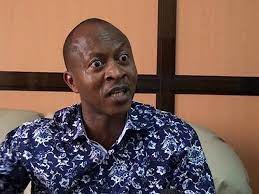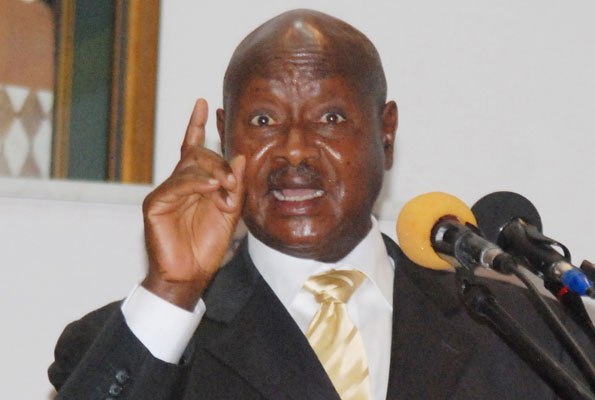Regional
An open letter to Frank Gashumba

Mr Frank Gashumba who wants to change Banyarwanda identity to Bavandimwe
Rwandan blogger Kelly
Rwamapera recently published an open letter to Frank Gashumba, sharing ideas
with the latter on his endeavours to change the name and identity of the
Banyarwanda people in Uganda from being called Banyarwanda (people of Rwanda
origin) to Bavandimwe (born of the same womb).
Rwamapera, among others,
noted how many Banyarwanda succeeded in not being identified as Banyarwanda
without molesting the whole tribe that has endured challenges for hundreds of
years in the region.
Read the open letter below:
An open letter to Frank
Gashumba
Dear brother Frank Gashumba,
I’m writing to share my
ideas with you in your endeavours to change the name and identity of the
Banyarwanda people in Uganda from being called Banyarwanda (people of Rwanda
origin) to Bavandimwe (born of the same womb).
I am aware of your arguments
that the name Banyarwanda identifies you with the Banyarwanda of Rwandan
nationality when you actually do not have any relationship with Rwanda apart
from being the land of your origin.
You also argue that
Banyarwanda are persecuted in Uganda and denied some basic rights that other
Ugandan nationals enjoy, categorising them as Banyarwanda of Rwandan
nationality where their forefathers left long ago.
I would like to talk about
your idea in the perception of history and law.
History has some clue
I won’t go into the history
of how the name Banyarwanda came to be our identity about 1,000 years ago but
let me rush to an incident in history where the Banyamurenge tried to change
their identity.
Most of the Banyamurenge are
from Banyabyinshi lineage of Byinshi son of Bamara son of King Yuhi Gahima of
Rwanda who ruled in the early 1500s before Buganda and Ankole became kingdoms.
Byinshi conspired in an
attack that killed his paternal uncle, King Ndahiro Cyamatare son of King Yuhi
Gahima and his children save one Ndori who was in Karagwe (Tanzania) with the
paternal aunt who had married King Karemera of Karagwe.
For over a dozen years,
Rwanda was divided into chiefdoms, until Prince Ndori son of Cyamatare who grew
up in Karagwe returned and ascended the throne as Ruganzu Ndori.
Byinshi, fearing that Ndori
would avenge his father’s death, fled with his family to Murenge the furthest
part of Rwanda Kingdom at the time, currently in DR Congo.
The Banyabyinshi changed
their identity from being called Banyarwanda to Banyamurenge in reference to
the Murenge (Runyarwanda word for hillside) they occupied until the identity
Banyamurenge was officially accepted in 1970s.
As you are aware, 500 years
down the road, the Banyamurenge are more known as Banyarwanda than Banyamurenge
and are suffering or enjoying what any Rwandan would face in DR Congo.
It looks like the
Banyarwanda substance doesn’t go away even after 500 years but one shouldn’t
worry if he/ she doesn't want to be identified among the Banyarwanda.
At a personal level, one can
dilute the Banyarwanda substance with intermarriages and not speaking
Runyarwanda (which many have already achieved and don’t suffer the persecution
you said).
Many Banyarwanda have
succeeded in not being identified as Banyarwanda without molesting the whole
tribe that has endured challenges for hundreds of years in the region.
The presence of Banyarwanda
in Uganda, particularly central Uganda Official records indicating the presence
of Banyarwanda as well as other tribes in Uganda start with the 1900 census,
officially confirmed in the 1911 administrative census.
All other censuses that
followed had no problem with documenting Banyarwanda as citizens in Uganda
until it was sealed in the 1995 Ugandan constitution under Article 10.
Even without official
records, there is irrefutable evidence that Banyarwanda have been in
present-day Uganda especially in west and central regions and occupied several
places way before others did.
I’m sure even
non-Banyarwanda do affirm that they don’t know what the name of places such as
Masaka, Mpigi or your home district Karungu mean, not forgetting the places
called Rwanda in Ankole, Buganda and other regions.
In Gomba, where I come from,
there are places called Kampefu from Runyarwanda word imihefu/impefu grass,
Rwabayaga from abayaga lineage of Abasinga clan, Mirambi meaning flat land,
Kagongero to mention but a few and it’s a fact that there are just a few places
in Buganda that bear Luganda names.
I want to assume that you
know that names of places are given by the first inhabitants, meaning that
makes Banyarwanda inhabited those hills before any others.
Some of us who know these
facts don’t marvel at the act of Rwandan refugees who dared join a bush war in
the country of their exile, toppled one government and installed another and
work in that government with due popularity.
We don’t wonder about it
because we know that history gives Banyarwanda an authority in Uganda as
natives of the land and anyone who despises that will always fall victim to
this reality.
Particularly
in Buganda
It is also worth mentioning
that the name Buganda is no strange in the Runyarwanda language in two ways: Ubuganda/
Obuganda - the use of “ubu-” to mean a certain place is typically Runyarwanda
style. The Luganda language does not use “obu-”/ “ubu-” prefixes to mean places
like it is in Runyarwanda.
When you examine the stem
word “-ganda” in the word Buganda, the word can be loosely translated as
“bundle” in both Runyarwanda and Luganda and unfortunately this does not in any
way explain the beginning of the kingdom.
However, “-ganda” in
Runyarwanda further means ‘to defy laws’ or ‘to secede from’ which gives a
clear explanation of the beginning of Buganda kingdom that started at the
shores of Lake Victoria through rebellion and secession.
For your information, there
is another Buganda in the nation of Burundi at an area that formally belonged
to Rwanda but was lost in secession wars. You may also consider that while the
spelling for the word Rwanda suggests a ‘w’, the pronunciation suggests a ‘g’
and in the first spelling rules, Rwanda could be written as "Rganda"
which carries the same stem word "-ganda".
You shouldn’t be surprised
to find that the name Buganda is not a Luganda but Runyarwanda name given to
the group of people who rebelled and seceded from a kingdom. I hope that after
you have heard these things that many don’t want to say or accept, and the fact
that Banyarwanda are one of the tribes in Uganda with many people, stay firm
where you are and claim your rights.
The
Bavandimwe idea
I first heard the
insinuation against Banyarwanda identity in 2007 from a friend of mine Robert
Barigye who also said he had heard from some senior leaders at the UMUBANO
association that Banyarwanda in Uganda should have a different identity from
the rest of the Banyarwanda in the Interlacustrine region.
That was before the start of
the alleged persecution that was made the current rationale for changing the
identity to Bavandimwe which makes the whole ideas “mpemuke ndamuke”
In late 2010, at the
elections of the leaders of the UMUBANO association, some were blaming Mr Donat
Kananura for refusing to spearhead an agenda for differentiating the
Banyarwanda in Uganda from the rest in the region.
The idea of changing the
identity has since been very infamous because it doesn’t make sense in face of
the fact that our forefathers never tried it even when they were just few and
now that the Banyarwanda in Uganda are over 11 million, more numerous than most
other tribes.
Our fathers did not attempt
changing identity when Banyarwanda were facing forced banishment to Rwanda in
the 1980s, and one wonders why trying to change our identity at a time when we
have established families with plots, miles of land and homes!
The admissibility and
legality of the Bavandimwe idea
What you’re advocating for
is against the constitution of the Republic of Uganda where there is no tribe called
Bavandimwe but Banyarwanda.
So, Bavandimwe is an
organisation not a tribe and it must not attack elements of the constitution
such as degrading the nationality of the Banyarwanda, a constitutionally
recognised tribe.
The Bavandimwe organization
thus shall not be registered because the 2016 Non-Governmental Organisations
Act, bars registration of any organisation “where the objectives of the
organisation as specified in its constitution are in contravention of the laws of
Uganda”.
I would advise your
organization to start to claim the rights of the Banyarwanda as nationals as
enshrined in the Ugandan constitution instead of endeavouring to remove
Banyarwanda identity after which you’ll be required to have the constitution
amended to replace Banyarwanda with Bavandimwe.
As I mentioned earlier, you
may opt for individual identity change and leave the rest to live as
Banyarwanda, the identity our forefathers enjoyed and were not ashamed of in
the face of trials.
By the way, if our identity
was a mere name, we would just pronounce another name and change forever.
Think of what we are,
brother.
Kelly Rwamapera
"Inshuti ya
Semugaza"


